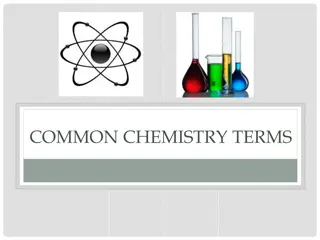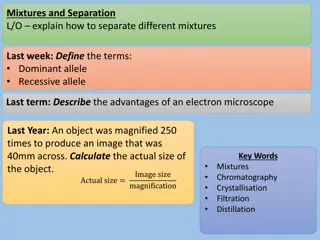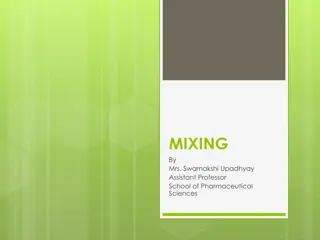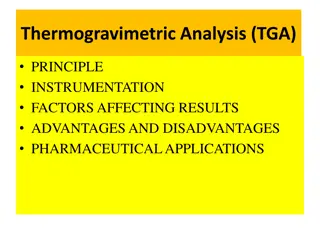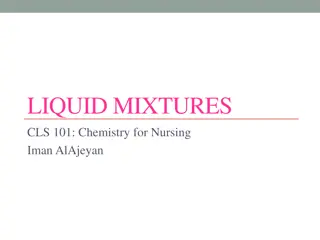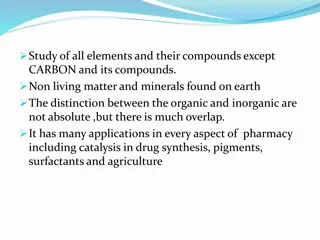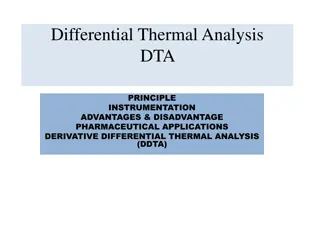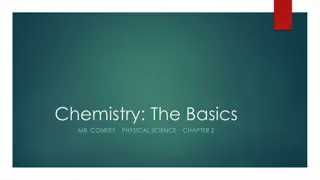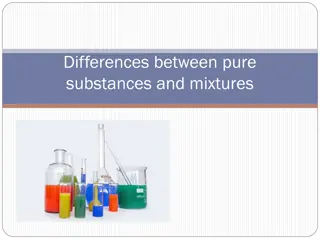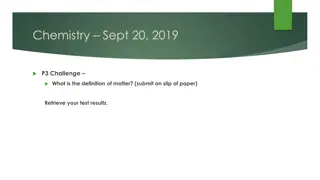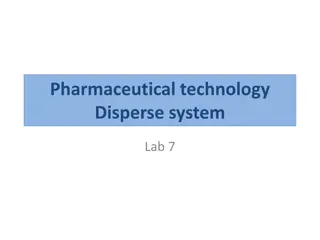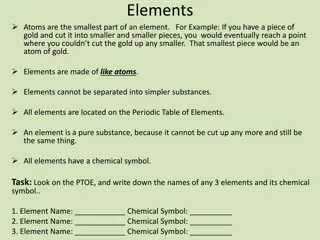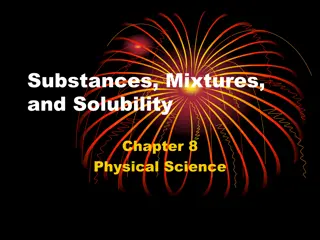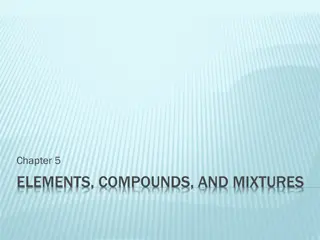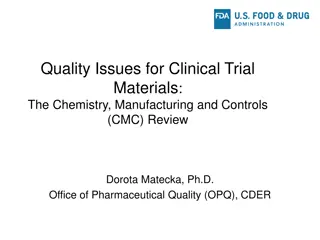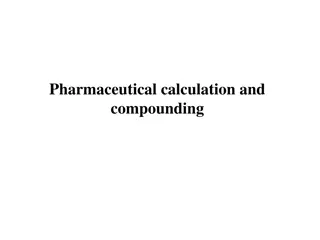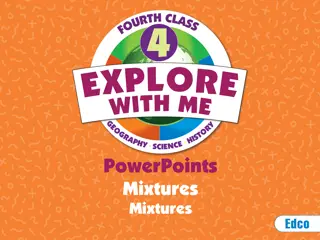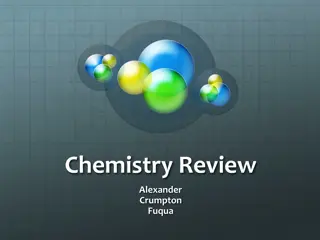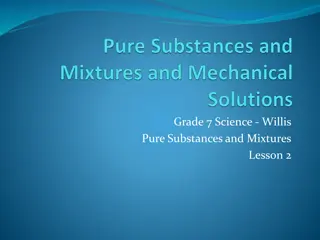Understanding Herbicide Mixtures, Compatibility, and Applications in Agriculture
Herbicide mixtures play a crucial role in weed control by combining different herbicides for enhanced efficacy. Various types of herbicide mixtures, including factory pre-mix and tank mix, offer advantages such as broad-spectrum weed control and delayed resistance development. Compatibility of herbi
3 views • 23 slides
Understanding Physiological Acid-Base Balance in Pharmaceutical Inorganic Chemistry
This lecture delves into the fundamental concepts of pharmaceutical inorganic chemistry, focusing on the mechanisms and uses of various pharmaceutical products that correct body disorders. Topics covered include acids and bases, intra and extracellular electrolytes, and the role of buffers in mainta
10 views • 14 slides
Understanding Pharmaceutical Calculations and Laboratory Apparatus
Pharmaceutical preparations must be effective, safe, and accurate in both quantitative and qualitative aspects. This includes ensuring the accurate amount and identity of ingredients. Laboratory apparatus such as mortar and pestle, wide mouth bottles, cylindrical and conical measure cylinders, and c
4 views • 20 slides
Understanding the Rule of Mixtures in Composite Materials
The Rule of Mixtures (ROM) is a weighted method for predicting the properties of composite materials, such as fiber-reinforced polymers (FRP). This method relies on assumptions regarding the homogeneity and properties of fibers and matrices. By combining volume fraction and properties linearly, the
5 views • 23 slides
Understanding Pharmaceutical Calculations: Altering Product Strength and Solutions
Pharmaceutical calculations involve altering the strength of pharmaceutical preparations by adjusting the proportion of active ingredients, using stock solutions, and problem-solving techniques. This process includes dilution, fortification, and concentration changes to achieve desired product stren
7 views • 23 slides
Understanding Common Chemistry Terms and Processes
Explore essential chemistry concepts such as matter, pH, acids, bases, mixtures, solutions, vaporization, sublimation, deposition, condensation, and freezing. Learn about the different states of matter, types of mixtures, and physical changes occurring in substances. Enhance your knowledge of chemis
0 views • 39 slides
Understanding Mixtures and Separation Techniques
Explore the concepts of mixtures and separation, from the definition of dominant and recessive alleles to the advantages of electron microscopes. Learn about identifying pure substances, differences between pure and impure substances, and techniques like filtration and crystallization for separation
1 views • 19 slides
Understanding Mixing Processes in Pharmaceutical Sciences
Mixing is a fundamental operation in pharmaceutical sciences, involving blending different substances to achieve uniformity. This process is crucial for various applications, such as chemical reactions, suspensions, and emulsions. The types of mixtures, factors affecting mixing efficiency, and diffe
0 views • 23 slides
Year 7 Science Curriculum Overview: Particle Model, Separating Mixtures, Cells
Understand scientific concepts, techniques, and procedures through topics such as particle model, separating mixtures, and cells. Learn to apply knowledge, conduct scientific inquiries, and analyze information to develop experimental procedures. Key skills include techniques for separating mixtures
1 views • 29 slides
Understanding Thermogravimetric Analysis (TGA) in Pharmaceutical Applications
Thermogravimetric Analysis (TGA) is a technique that measures weight changes in a material as it is heated or cooled. This analysis helps in understanding decomposition, stability, and purity of pharmaceutical compounds. TGA operates on the principle of monitoring mass changes with temperature, offe
0 views • 27 slides
Methods of Separating Mixtures in Natural Sciences Grade 7
Separating mixtures is an essential part of studying matter and materials. Methods like hand sorting, sieving, and using a magnet are commonly used to separate substances based on physical properties. Hand sorting involves sorting by size, color, texture, and shape, while sieving uses sieves with di
1 views • 18 slides
Understanding Liquid Mixtures in Nursing Chemistry
A comprehensive overview of liquid mixtures in nursing chemistry, including types of mixtures, properties of solutions and suspensions, and the distinction between homogeneous and heterogeneous mixtures. Explore the concepts of solutions, suspensions, colloids, and emulsions with clear explanations
7 views • 18 slides
Inorganic Pharmaceutical Chemistry: Applications and Importance
Inorganic pharmaceutical chemistry explores the study of elements and compounds excluding carbon, with diverse applications in pharmacy. It encompasses the synthesis and use of inorganic compounds in drug development, catalysis, pigments, and agriculture. The field also delves into the medicinal val
1 views • 6 slides
Understanding Differential Thermal Analysis (DTA) in Pharmaceutical Applications
Differential Thermal Analysis (DTA) is a technique used in pharmaceutical applications to monitor temperature differences between a sample and reference material. By analyzing temperature changes over time or against temperature, DTA helps in detecting phase transitions and reaction temperatures in
0 views • 22 slides
Understanding Liquid Mixtures in Nursing Chemistry
Explore the world of liquid mixtures in nursing chemistry with a detailed look at solutions, suspensions, colloids, and emulsions. Learn about the properties of solutions and suspensions, the distinction between homogeneous and heterogeneous mixtures, and the various types of liquid mixtures encount
7 views • 18 slides
Excessive Pricing in Pharmaceutical Markets: The Italian Experience
The presentation by Andrea Pezzoli explores the issue of excessive pricing in pharmaceutical markets, focusing on the Italian experience. It covers cases of infringement on excessive prices, such as the Aspen pharmaceutical group's fine for unfair pricing. The regulatory framework in Italy, includin
4 views • 22 slides
India's Significant Contributions to Global Healthcare Through Pharmaceutical Exports
India, a key player in the global pharmaceutical sector, significantly contributes to global health through its pharmaceutical exports. The country provides generic medicines to over 200 countries, with a notable presence in highly regulated markets. India's pharmaceutical exports showcase impressiv
7 views • 7 slides
Exploring the Mysteries of Cornstarch and Water Mixtures
Dive into the fascinating world of cornstarch and water mixtures with this engaging experiment. Discover the unique properties of this mysterious substance as it transitions between liquid and solid states based on external forces. Explore the science behind homogenous and heterogeneous mixtures, an
0 views • 20 slides
Understanding Matter: Elements, Compounds, and Mixtures
Exploring the world of matter, this content delves into the classification of elements, compounds, and mixtures. Through engaging activities like classifying matter types and learning about pure substances, students deepen their knowledge about the building blocks of the universe. The visuals and ex
2 views • 13 slides
Fundamentals of Chemistry: Matter, Mixtures, and Data Organization
Explore the basics of chemistry including precision vs. accuracy, organizing scientific data with graphs and tables, direct vs. inverse proportion, and the classification of matter into pure substances, compounds, and mixtures. Delve into the concepts of elements, atoms, and the properties of compou
0 views • 20 slides
Understanding Mixtures of Materials in Grade 6 Natural Sciences and Technology
Exploring mixtures of materials in Grade 6 Natural Sciences and Technology, students learn about what mixtures are, examples of mixtures including solids and liquids, mixing solids, separating substances, and mixing liquids. The content also discusses the visibility of different substances in mixtur
0 views • 8 slides
Pure Substances vs. Mixtures: Characteristics and Differences
Pure substances have a fixed composition and distinct properties, while mixtures vary in composition and properties. Pure substances cannot be separated into simpler substances by physical methods, whereas mixtures can be. This article explores the characteristics, distinctions, and examples of pure
0 views • 13 slides
Insights from Asphalt Mixtures Testing Section Engineer's Meeting 2015
Discussed topics include FHWA audit on surface mixtures, regulatory compliance, acceptance procedures, NMAS changes in different mixes, durability issues, and use of recycled materials in asphalt mixtures. Suggestions made for running verification tests, extending sample retention time, and implemen
0 views • 10 slides
Understanding Matter and its Classification in Chemistry
Matter is defined as anything that occupies space and has mass. It can be classified into solids, liquids, and gases, as well as pure substances and mixtures based on their composition. This overview covers the states of matter, Aristotle's four elements theory, and the classification of matter into
0 views • 13 slides
Understanding Pharmaceutical Suspensions: Types, Preparation, and Characteristics
Explore the world of pharmaceutical suspensions, including their types based on dosage form and particle size, advantages of using suspensions, features desired in pharmaceutical suspensions, and classification based on the nature of solids involved in the suspension. Learn about the preparation met
0 views • 12 slides
Understanding Chemistry: Elements, Molecules, Compounds, and Mixtures Flow Chart
In the world of chemistry, elements are the building blocks represented on the Periodic Table, while molecules and compounds are formed by atoms bonding together. Mixtures, on the other hand, involve a combination of substances without chemical bonding. Physical and chemical properties define matter
0 views • 7 slides
Exploring Elements, Compounds, and Mixtures: A Classroom Review Activity
In a classroom review activity with tables labeled as left, middle, and right, various elements, compounds, and mixtures were discussed. The review involved identifying substances such as gold (Au), water (H2O), iron (Fe), and chicken soup. Through these examples, students learned to differentiate b
0 views • 28 slides
Understanding Substances, Mixtures, and Solubility in Physical Science
Explore the concepts of substances, mixtures, and solubility in Physical Science with a detailed explanation of solutions, types of mixtures, and the importance of understanding these in everyday life. Discover the differences between atoms, elements, pure substances, and mixtures, and learn about h
0 views • 81 slides
Understanding Mixtures and Solutions in Chemistry
Learn about the differences between mixtures and solutions, how they are classified, and examples of each. Discover how mixing salt and water demonstrates the concept of a solution. Understand the physical properties and compositions of mixtures and solutions.
0 views • 5 slides
Understanding Elements, Compounds, and Mixtures in Chemistry
Explore the world of matter through elements, compounds, and mixtures. Learn about the differences between physical and chemical changes, as well as the properties of pure substances. Discover the characteristics of elements and compounds, along with the concept of chemical formulas. Dive into the r
0 views • 26 slides
Quality Issues in Clinical Trial Materials: CMC Review by Dr. Dorota Matecka
Clinical trial materials undergo Chemistry, Manufacturing, and Controls (CMC) review to ensure pharmaceutical quality. This process includes assessing safety concerns, impurities, and specifications, along with other CMC considerations. Pharmaceutical quality encompasses the suitability, identity, s
0 views • 41 slides
Understanding Mixtures: Homogeneous vs Heterogeneous and Separation Techniques
Explore the differences between homogeneous and heterogeneous mixtures, with examples like Cheerios and trail mix. Learn about mixtures like apple juice and orange juice with pulp. Discover how to separate mixtures based on their composition, whether they are homogeneous or heterogeneous, using tech
0 views • 16 slides
Understanding Elements, Compounds, and Mixtures in Chemistry
A comprehensive explanation of elements, compounds, and mixtures in chemistry. Elements are pure substances composed of only one kind of atom, while compounds consist of two or more kinds of atoms chemically combined. Mixtures involve two or more substances that are not chemically bonded, which can
0 views • 7 slides
Pharmaceutical Calculation and Compounding Course Overview
This course provides pharmacy students with a foundation in pharmaceutical calculations including concentration expressions, density, isotonicity, and more. The curriculum focuses on practical skills essential for pharmacy practice. Students will learn how to handle medicinal prescriptions and perfo
2 views • 46 slides
Understanding Mixtures: Types and Examples
A mixture is a combination of different ingredients that can be separated. There are various types of mixtures such as liquid solutions, solid solutions, and gas solutions. Liquid solutions involve solid substances dissolved in a liquid, like sugar in water, while solid solutions include metal alloy
0 views • 15 slides
Understanding Buffers in Pharmaceutical Formulations
Buffers in pharmacy play a critical role in maintaining constant pH levels essential for drug stability and efficacy. They resist pH changes by neutralizing added acids or bases, ensuring proper drug delivery and patient comfort. Common buffer systems, such as acetic acid/sodium acetate and boric ac
4 views • 18 slides
Update on Pharmaceutical Manufacturing Plan for Africa by Dr. Djoudalbaye Benjamin
The update on pharmaceutical manufacturing plan for Africa discusses the TRIPS agreement, the inception of the Pharmaceutical Manufacturing Plan for Africa (PMPA), and the importance of promoting access to quality healthcare through local pharmaceutical manufacturing in Africa.
0 views • 25 slides
Chemistry Fundamentals: Elements, Mixtures, Metals, and Changes
Explore fundamental concepts in chemistry including elements found on the periodic table, types of mixtures, characteristics of metals and non-metals, periodic table groups, chemical vs. physical properties, and changes in matter. Learn about the properties and behaviors of elements, compounds, and
0 views • 12 slides
Understanding Matter: Properties, Changes, and Classification
Explore the classification of properties and changes in matter, including physical and chemical properties, extensive and intensive properties, pure substances versus mixtures, and homogeneous versus heterogeneous mixtures. Learn about pollution-producing processes involving physical changes and the
0 views • 7 slides
Understanding Pure Substances and Mixtures in Science
Explore the concepts of pure substances and mixtures in science, distinguishing between them and understanding their particle theory. Learn about mechanical mixtures and solutions, and discover why apple juice is classified as a mixture. Delve into the classification of mixtures and the states of so
0 views • 11 slides





